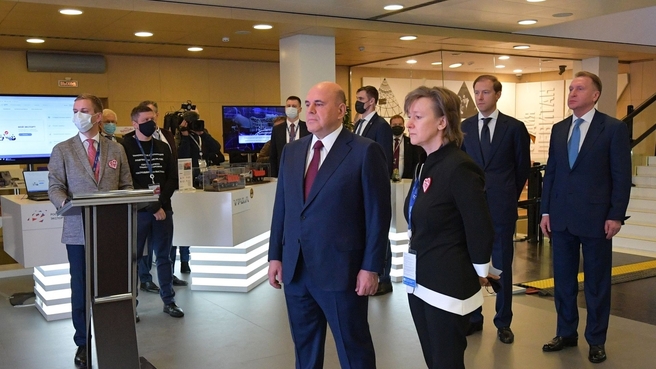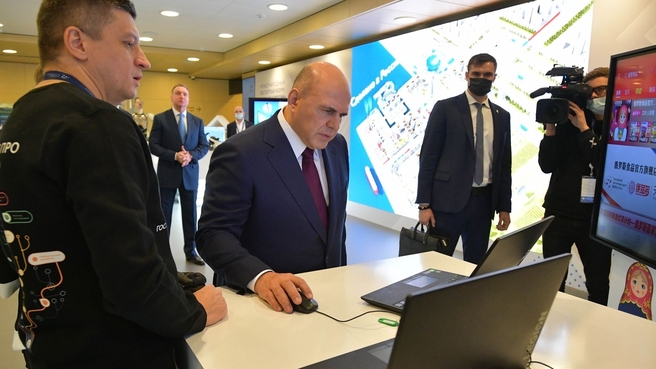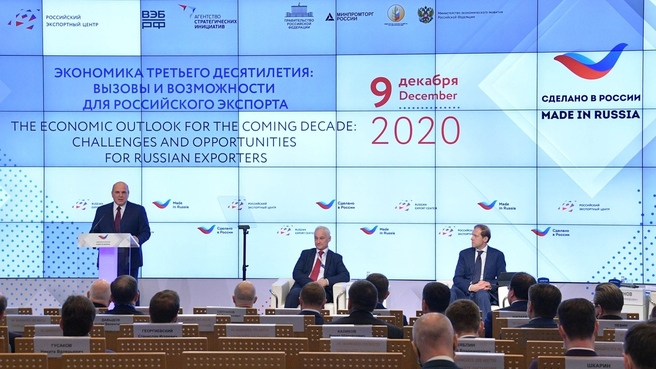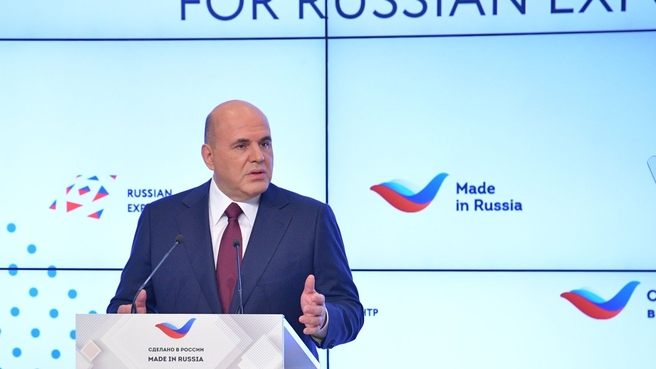The Prime Minister toured the exhibition of high-tech goods and services in medicine, IT and industry, and addressed a plenary discussion, Third Decade Economy: Challenges and Opportunities for Russian Exports.
The forum has been held since 2012. Over the years, it has become a key platform for discussing topical issues of implementing the International Cooperation and Exports national project and for working out practical solutions to boost exports of Russian goods and services.
Its main objectives are to identify the present-day export trends and show the opportunities that the state and development institutions offer exporters.
This year, the business programme includes roundtable discussions on export issues and linkups with foreign countries and Russian regions.

Touring the exhibition of high-tech goods and services of Russian exporters in medicine, IT and industry at the 2020 Made in Russia International Export Forum

Touring the exhibition of high-tech goods and services of Russian exporters in medicine, IT and industry at the 2020 Made in Russia International Export Forum

Touring the exhibition of high-tech goods and services of Russian exporters in medicine, IT and industry at the 2020 Made in Russia International Export Forum

Touring the exhibition of high-tech goods and services of Russian exporters in medicine, IT and industry at the 2020 Made in Russia International Export Forum
Touring the exhibition of high-tech goods and services of Russian exporters in medicine, IT and industry at the 2020 Made in Russia International Export Forum
Mikhail Mishustin’s remarks:
Good afternoon, friends.
I am glad to greet the participants and guests of the Made in Russia International Export Forum, including those who are joining us today online. This year, the forum’s events will be broadcast for participants in over 30 countries for the first time ever.
This forum is very important both for Russia and, of course, our foreign partners. It provides new opportunities for developing business and for strengthening international economic ties, which is especially relevant now.
Our country produces goods that can and should compete on the world markets. Some of them are unique. The Government sees its task in increasing the share of Russian products in foreign trade. In facilitating their promotion on foreign markets amid new challenges, we need, of course, to create up-to-date instruments.
The world trading system was highly unbalanced long before the coronavirus, which we often mentioned, including because of growing protectionism, unfair competition and trade wars, as well as energy price volatility and the GDP slowdown. All this contributed to the unbalanced world trading system. This year the International Monetary Fund is expecting a more than four-percent nosedive of the global GDP. There are few sectors that managed to preserve the same development rates and production levels as last year. Certainly, there are some exceptions.
In all countries people expect their governments to take such decisions, which would help overcome the recession in national economies. And Russia is no exception here. We can see that the enterprises which successfully promote their products for export can recover their sales quicker and preserve jobs, which is very important today.
Our goal is to create a large sector of competitive production facilities in industry and agriculture within the shortest time possible. To this end, we should provide for the most comfortable conditions for businesses, which are prepared to vie for foreign markets. Of course, it is our goal and priority, including for the Government. I mean not only major companies, but also medium-sized and small businesses. Today, we saw at the exhibition excellent examples of export support for small and medium-sized enterprises.
The President set the task of achieving real growth in non-resource-based and non-energy exports by 2030 to increase their share to over 70 percent compared to 2020. And the Government has adjusted the International Cooperation and Exports national project for this purpose. Now it contains much clearer defined measures, which would tap Russia’s export potential to the maximum. The amount of non-resource-based and non-energy exports exceeded $111 billion over the first nine months of this year alone. Despite additional restrictions on the supply of goods from abroad imposed in many countries over the recent months, we can also see the reverse trend. Some countries, on the contrary, increased their purchases, including for accumulating emergency reserves. This is why the list of prospective suppliers grew faster in many areas.
There are a number of industries, including agriculture, that have taken advantage of these opportunities. Agricultural exports have grown by 15 percent over the first 10 months of this year. There is positive momentum in pharmaceuticals, plastics and the light industry supplies, as well as in metallurgy exports and those in a number of other industries over the first nine months.
And of course, we could see a large, literally explosive demand for such products as coronavirus vaccines. But first of all, we plan to provide them to Russian citizens.
We count on growth in other sectors, including the IT industry. Today at the exhibition, we saw wonderful examples of solutions, including export software solutions from Russian manufacturers.
At the same time, I would like to emphasise that the national project goals are much broader. It is necessary to ensure the widest possible diversification of non-primary exports in terms of greater diversity of goods and services, as well as in terms of investment in the development of deep-processing products; more actively use the most modern digital solutions that are convenient for exporters and cut red tape for businesses that work in this area; implement an integrated approach throughout the entire life cycle, from production and sales to the development of support infrastructure as part of post-export services.
It is for this purpose that we are significantly increasing funding for the activities planned under the national project. This year about 74 billion roubles were allocated to support exports, while next year’s federal budget has already set aside about 96 billion roubles.
Now a few words about the new export support tools that were launched this year.
First, a comprehensive digital one-stop-shop platform to support exporters developed by the Russian Export Centre came online two weeks ago. Today we saw it at the exhibition. Importantly, it will provide businesses with online access from a single point to government services that accompany companies entering foreign markets. Now the exporter can submit an online application to confirm a zero VAT rate, apply to participate in exhibitions and business missions, and receive a free sale certificate, which confirms that the goods are manufactured in accordance with Russian law and can freely circulate in Russia.
These and other government services are the first step towards the introduction of paperless document flow for exporters, a real time and effort saver for our entrepreneurs. And it is important that the Russian Export Centre will continue to expand its range of digital services aimed at increasing the competitiveness of Russian exporters in world markets, develop this system, and offer other services on this platform, including financial services, such as insurance.
The second most important area of work is the introduction of an export support system in the regions of the Russian Federation, primarily for small and medium-sized businesses. Export support centres have already been launched in 82 regions. Their main task is to provide comprehensive assistance to small and medium-sized entreprises who are ready to enter foreign markets, but, of course, need serious support, to teach people the basics of export activities, help them choose a sales market, search for a foreign partner, and provide support for the signed export contract.
In addition, the so-called Regional Export Standard 2.0 is being implemented. Over the past year, this system underwent testing in 11 regions of the Russian Federation, and next year it will appear in 40 regions, and I hope, by 2024, everywhere. This is an extremely important element of creating export infrastructure. It includes working out a regional development strategy in this area, training the management team, getting the business community involved, developing e-commerce, and training personnel at local educational institutions, as well as a number of other important activities.
Third, we are creating a council of non-resource exporters. It includes not only successful export entrepreneurs, but also representatives of business associations such as the Chamber of Commerce and Industry, RUIE [the Russian Union of Industrialists and Entrepreneurs], Delovaya Rossiya and OPORA Russia. Today, the forum will host the first meeting of the Council. We expect that the Government and businesses will prepare proposals to improve the competitiveness of Russian non-resource and non-energy products, as well as to develop and improve the business climate.
The forum has a packed agenda. There are plans to discuss topics that are important for government agencies and for business. These include new strategies for entering foreign markets through electronic trading platforms, setting up a system of state support for exporters both at the federal level and, as I have already said, in the regions, and developing digital services.
I ask the Government members who are taking part in the forum today to listen carefully to the wishes of exporters and formulate proposals to solve their problems and provide any assistance needed.
In conclusion, I would like to congratulate the finalists of Exporter of the Year, a Russian award in the field of international cooperation and exports. This year's competition set a record, despite all the restrictions and the pandemic, with more than 1,700 companies vying for recognition of their success in exporting goods, services and intellectual products. The entire country was represented. I am very pleased to personally congratulate everyone on the successful completion of the contest and wish them new victories in the future. After all, the success of each of you is the success of Russia.
I would like to wish all forum participants success in their work.
Thank you.














